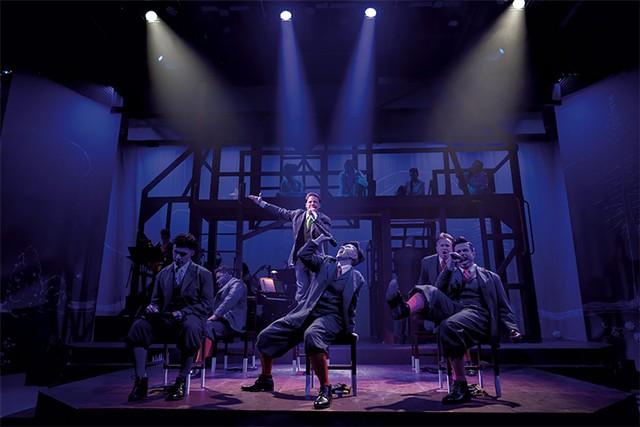click to enlarge 
- Courtesy Of Mark Washburn
- Spring Awakening cast at Northern Stage in 2022
From small community productions to star-studded summer stock, Vermont's theater scene is as rich and vibrant as a technicolor dreamcoat. And few know it as intimately as Alex Brown.
Since 2012, Brown has served as Seven Days' ace theater critic. She's logged thousands of miles trekking to far-flung theaters and playhouses across the state to review upwards of 15 plays per year. The Bennington College and New York University grad is a director herself and deeply knowledgeable about the craft. But her reviews are never academic. Brown is the rare critic who impresses as much with the wit and accessibility of her insights as with her smarts. Reading one of her reviews is like sitting beside her in a packed house.
Recently, Seven Days spoke with Brown about the enduring allure of live theater at a time when the entirety of recorded entertainment is available at the push of a button. For average theatergoers eager to understand the workings of that experience, she also offered tips on how to watch a play the way she does.
So, make the case: In the age of Netflix, why should I go see live theater?
That really seems like the question to ask. But you know, I'll ask you this: Was anyone interested in Taylor Swift's Eras Tour?
And how.
And why do you think that was? There's something about being in the presence of a performer, and in the presence of an audience watching them, that is just immutably big in and of itself. You're seeing something live take place before your very eyes that might surprise you a great deal.
Being in the presence of a performer of any kind — music, sports, dance, circus, any of those things — and seeing something that's only going to happen one time, and knowing that your connection to everyone in the audience and your connection to the performer is actually real in that physical space — you don't have that when you go to the movies. You don't have it when you listen to a recording of music or of a movie. In fact, you don't even have the same experience streaming a movie as you do being in an audience for a movie.
I just think that this is inarguable, that something actually happens when you are connecting with the performers and the audience.
When you take a seat at the Weston Playhouse or Unadilla Theatre, what are you watching for?
click to enlarge 
- Courtesy Of Clarke Jordan
- Alex Brown
First of all, the single most important thing is to let go, to experience it, to see what happens to you.
When I review a play, I'm trying to do two things. I am trying to have every little ounce of the experience that everyone around me is. I have to let go. I have to surrender to it. I have to see what's there. I want the experience. I am not at a distance. I am not at a remove. I want to know: Is this making me laugh? Is this making me worry? Do I wonder what's going to happen next?
Almost at the same time, I am trying to walk out of the theater with a vivid and very complete memory of the apparatus that caused it all to happen — the structure of the play, the techniques that this theater used and that these performers used.
How can a layperson pick up on some of those pieces?
As I said, I truly want to recommend that people just experience theater; don't worry about the mechanics. But if you wanted to look for one thing that helps you understand how a play works — and this applies to movies, musicals, comedies, drama, everything: All performing arts must compress time.
The story that is being told is usually one in which some type of problem or obstacle or other character is having an effect on one or more characters. For that problem to be important, for it to hurt or change a life, it has to take time, which is something a play has very little of.
Can you give me an example?
How long does it take for Romeo and Juliet to fall in love? They look at each other. And they talk to each other. And they each touch the other's hands. That's it. That's all it takes. That's compression of time. And it takes powerful playwriting and performance to do it.
So if you're trying to understand how a play or a movie works, how much did it compress time? And how elegantly did it do it? How did it use the limited action it had time for? How did it make one action stand for something gigantic? Also, what actions did it leave out and have either spoken, implied or told as confessions or stories by characters?
The structure of time, and storytelling itself, is delightfully unusual in movies and plays. And you can learn about why they work by seeing how they compress time.
Theater involves more investment than putting on a movie at home — of time, travel and money. But it seems there's also a pretty good payoff.
I think everyone should experience what it means to be part of an audience. Because it can be uplifting; it can be a little bit transformative. It can show you something about what entertainment is that isn't passive.
Theater is risk. It is a risk that I happen to consider really rewarding to watch. The actors are going to risk something. The audience is going to be part of something and partake of it with each other.
And that risk is: We don't know what will happen tonight. Will this miracle happen? It just might. Will there be a special night that I saw that was unlike any other? Maybe. I've had some times in theater that I will remember forever. And theater has a way of rewarding any audience that wishes to partake of it.
This interview was edited and condensed for clarity and length.
Rave Revues: Upcoming Vermont Theater Highlights
click to enlarge 
- Courtesy Of Joanne Greenberg
- Time Stands Still
Vermont theater companies are as busy as ever, churning out high-level productions. Here are seven shows to mark on your calendar.
Time Stands Still, Green Room Productions, September 15 and 16 at the Grange Hall Cultural Center in Waterbury Center; and September 22 and 23 at Off Center for the Dramatic Arts in Burlington, offcentervt.com, facebook.com/greenroomvermont
Returning home after covering war in the Middle East, a photojournalist finds herself torn between her career and domestic life in this Broadway hit from Pulitzer Prize winner Donald Margulies.
Cadillac Crew, Vermont Stage, September 27 to October 15 at Main Street Landing Performing Arts Center in Burlington, vermontstage.org
Four Virginia civil rights activists in the 1960s debate whether the proclamation of "equality amongst mankind" includes women.
Murder in the Studio, Essex Community Players, September 29 to October 8 at Memorial Hall in Essex, essexplayers.com
An evening of whodunits is composed of a trio of Agatha Christie murder mystery radio plays.
The Glass Menagerie, the Valley Players, September 29 to October 15 at Valley Players Theater in Waitsfield, valleyplayers.com
Theater doesn't get much more classic than Tennessee Williams' tale of a single mother and her children struggling to survive in the Great Depression.
The Haunting of Hill House, Lamoille County Players, October 6 to 15 at Hyde Park Opera House, lcplayers.com
This spine-tingler is based on Shirley Jackson's classic haunted house novel.
Selling Kabul, Northern Stage, October 11 to 29 at Barrette Center for the Arts in White River Junction, northernstage.org
A former U.S. military interpreter hiding from the Taliban faces an impossible decision on the eve of his son's birth in Sylvia Khoury's Pulitzer Prize-nominated drama.
Suite Surrender, Girls Nite Out Productions, November 9 to 19 at Main Street Landing Performing Arts Center in Burlington, girlsniteoutvt.com
Two divas are assigned the same suite at a deluxe Palm Beach hotel in Michael McKeever's farcical ode to 1940s Hollywood. Hilarity ensues.





















































